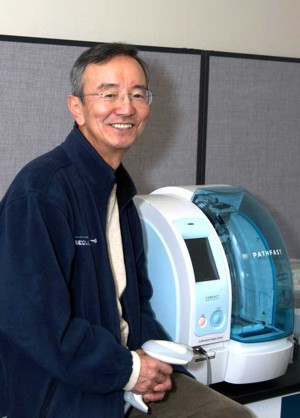New geneLEAD Product Launch, OEM Agreement Keep Precision System Science Busy
New geneLEAD Product Launch, OEM Agreement Keep Precision System Science Busy
The rebounding economy has translated into heightened activity at Hacienda's Precision System Science, Co., Ltd (PSS). An original equipment manufacturer (OEM) of robotic instruments for nucleic acid amplification tests (NATs), PSS is seeing strong interest from biotech customers looking to add value to their own product offerings. The incorporation of PSS's automated robotic systems is a constructive way to gain a competitive advantage in the drug discovery and development arena.
The American arm of Japan's Precision System Science Co. Ltd., PSS ended 2012 with two key announcements - the launch of a new product line and the signing of a new customer agreement.
The new product, geneLEAD, is a fully automated "sample-to-answer system." Current applications are targeted predominantly at the clinical diagnostic lab, where patient blood samples are analyzed to determine a specific disease or infection. "We call it our all-in-one system," explains Jeanne O'Grady, CEO of PSS USA. "The blood sample goes in and the answer comes out. The results are critical for cancer management, infectious disease control, and viral detection."
The new geneLEAD represents a major development for the company, whose focus, up until now, has been primarily on the sample preparation phase of the molecular testing process. Fully-automated and integrated instruments for NATs are powerful tools for the molecular diagnostic laboratory.
The instruments can process all steps in the testing, including extraction of DNA/RNA from various samples, reaction set up, amplification of target gene, and detection/analysis of the products. Their operation is based on PSS's proprietary Magtration technology for nucleic acid extraction and allows different methods for analysis of the amplified products to be incorporated in the process.
"Now we begin the analysis part" is the way O'Grady describes the company's technology advance.
In December PSS also signed a third development agreement with Roche, extending their long-standing relationship by moving beyond automated DNA extraction to "the challenging field of DNA sequencing," says O'Grady. Aimed at overcoming the bottleneck of sample preparation, the development effort is expected to promote wider use of Roche's advanced sequencing technology. "Preparing samples for sequencing is a complex, high-skill process," she relates. There are so many "bits and pieces" involved in getting a sample from the patient's body to a sequencer.
The resulting new instrument will streamline the sample preparation workflow by automating the entire emulsion PCR (polymerase chain reaction) process, reducing the total hands-on time from hours to minutes, a major benefit to the pharmaceutical and diagnostics leader. "The automated solution will not only improve the efficiency of laboratory workflows, but also increase the reproducibility of results by eliminating manual workload," Roche commented in the agreement announcement.
While the major scientific work on PSS products takes place in Japan, O'Grady notes that the Hacienda technical staff has assisted with optimization. "The folks here work on the application side, suggesting how customers can actually use our technology."
For more information, visit pssbio.com.
Photo: Dr. Kim Obata of PSS demonstrates one of the company's devices. (Photo credit: Creatability LLC)
Also in this issue ...
- Mortgage Automator Ellie Mae Expands, Celebrates Performance at the NYSE
- AFS: The Gathering Place Provides Homey Setting for Foster Visits
- Business Bits
- Executive Profile: Pandit Lathi, Pleasanton Business Solutions
- New geneLEAD Product Launch, OEM Agreement Keep Precision System Science Busy
- Silicondust Provides HD TV throughout the Entire Run of the Home
- Following a Strong Showing in 2012, Pleasanton is Poised to Continue as a Center of Economic Vitality
- Bring Your Sense of Humor to Axis April Fool's 5k Walk and Run April 7th
- Planning Underway for American Cancer Society's Relay For Life in July
- HR Professionals Build 'Real' Networks at Tri-Valley NCHRA Meetings
- Hacienda Online
- Hacienda Special Offers
- Hacienda Index
- Calendar





